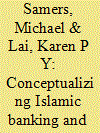|
|
|
Sort Order |
|
|
|
Items / Page
|
|
|
|
|
|
|
| Srl | Item |
| 1 |
ID:
152097


|
|
|
|
|
| Summary/Abstract |
In response to the limited engagement with critical social science concerning the governance of Islamic banking and finance (IBF), this paper compares and conceptualizes the development and governance of IBF in Malaysia and Singapore. We argue that IBF governance in Malaysia and Singapore can be distinguished on the basis of ethnic politics, moral suasion, product demand, product innovation, and the character of state practices. Concerning the latter, we contend that the political economy of both countries can be characterized as broadly involving a ‘neoliberal-developmentalism’, but we nuance this by positing a transition in Malaysia from a ‘semi-developmentalism’ in the 1980s to what we call an ‘Islamic and internationalising ordoliberalism’ beginning in the 2000s. In turn, the governance of IBF in Singapore involves a combination of neoliberal developmentalism, which nonetheless also entails some form of Islamic ordoliberalism.
|
|
|
|
|
|
|
|
|
|
|
|
|
|
|
|
| 2 |
ID:
153348


|
|
|
|
|
| Summary/Abstract |
Since colonial times to the present day, Hong Kong's position as a global financial centre is one of the enduring economic strengths of the territory. This success is often attributed to the distinctive role of the state, coined in the 1970s by the-then financial secretary, Sir Philip Haddon-Cave, as “positive non-interventionism.” The relationship between the market and the state has also been characterized as a form of corporatism, particularly in the financial sector as bankers were able to influence policy. However, closer examination of the behind-the-scenes relations between bankers and the state reveals a much more complex relationship, with the banks seeking protection that the government was not willing to provide. Moreover, the reluctance to regulate financial markets resulted in piecemeal interventions and weak implementation that undermined the stability of this sector and of the economy as a whole. This paper demonstrates the confusion over the concept and practicalities of positive non-interventionism, even for Haddon-Cave, and how the concept evolved towards a policy of “when in doubt, do nothing” during a period of financial instability. Along the way, the paper presents new evidence about the origins of Hong Kong's current banking structure.
|
|
|
|
|
|
|
|
|
|
|
|
|
|
|
|
|
|
|
|
|